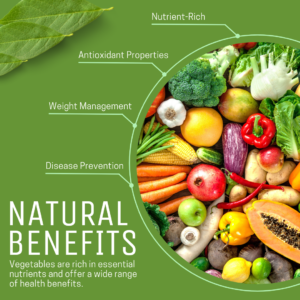Carrots are one of the most popular vegetables around the world. Whether you’re munching on a raw baby carrot as a quick snack, roasting them for a side dish, or adding them to a hearty stew, carrots have earned their place in countless kitchens for their versatility, flavor, and health benefits. Packed with nutrients, particularly beta-carotene, they offer a wide range of health advantages, making them a staple vegetable that not only satisfies hunger but also supports overall wellness.
In this blog, we’ll dive deep into the nutritional profile of carrots, explore the different ways to incorporate them into your diet, examine their health benefits, and share tips for growing and selecting the best carrots.
Nutritional Powerhouse: What Makes Carrots So Healthy?
Carrots may be small, but they pack a serious nutritional punch. Let’s break down their key nutrients:
1. Beta-Carotene and Vitamin A
The most well-known nutrient in carrots is beta-carotene, a pigment that gives the vegetable its bright orange hue. Once consumed, beta-carotene is converted by the body into vitamin A, an essential nutrient for several important bodily functions. Vitamin A is crucial for maintaining healthy vision, particularly night vision, as it plays a key role in protecting the surface of the eye. Deficiency in vitamin A can lead to conditions like xerophthalmia, a serious disease that can damage your vision and cause blindness.
Vitamin A is also vital for skin health, helping to maintain healthy tissues and mucus membranes. Furthermore, it contributes to the normal functioning of the immune system, keeping you well-defended against illnesses.
2. Antioxidants
Carrots are a rich source of antioxidants, which protect your body from oxidative stress caused by free radicals. These free radicals can lead to cellular damage and contribute to chronic diseases such as heart disease, cancer, and neurodegenerative disorders. Alongside beta-carotene, carrots also contain other antioxidants like alpha-carotene and lutein, which are known for promoting eye health and reducing the risk of age-related macular degeneration.
3. Fiber
Carrots are an excellent source of dietary fiber, which is essential for digestive health. One medium-sized carrot contains about 2 grams of fiber, helping to promote regular bowel movements and prevent constipation. Fiber also aids in controlling blood sugar levels by slowing down the absorption of sugar in the bloodstream, which can be particularly beneficial for those with diabetes. Moreover, fiber contributes to heart health by reducing cholesterol levels and lowering the risk of heart disease.
4. Vitamins and Minerals
In addition to vitamin A, carrots are packed with other essential vitamins and minerals. These include vitamin K1, which is important for blood clotting and bone health, vitamin C, which supports immune function and helps with the absorption of iron, and potassium, which plays a role in blood pressure regulation and heart function.
Health Benefits of Carrots
With such a rich nutritional profile, it’s no surprise that carrots offer a wide range of health benefits. Here are some of the top reasons to add more carrots to your diet:
1. Improved Eye Health
Carrots have long been associated with good vision, and for a good reason. The beta-carotene in carrots is converted into vitamin A, which is critical for maintaining healthy eyes and preventing conditions such as night blindness. Additionally, the antioxidants in carrots, like lutein and zeaxanthin, help protect against age-related macular degeneration and cataracts.
2. Cancer Prevention
The antioxidants found in carrots may play a role in reducing the risk of certain types of cancer. Studies have shown that diets rich in beta-carotene are associated with a lower risk of lung cancer, and there is evidence to suggest that the compounds in carrots may also help protect against colorectal cancer. The fiber content in carrots further adds to their cancer-fighting properties by promoting healthy digestion and reducing the buildup of harmful substances in the colon.
3. Heart Health
Carrots are beneficial for heart health in several ways. First, their fiber content helps to lower cholesterol levels, which can reduce the risk of heart disease. Carrots are also rich in potassium, which can help regulate blood pressure by counteracting the effects of sodium in the body. Furthermore, the antioxidants in carrots help to combat inflammation and prevent oxidative stress, both of which are key contributors to heart disease.
4. Weight Management
If you’re looking for a healthy, low-calorie snack, carrots are an excellent choice. One medium carrot contains only about 25 calories, making them a filling but diet-friendly food. The fiber in carrots also helps you feel full for longer, reducing the likelihood of overeating.
5. Skin Health
The high content of vitamin A in carrots is not only good for your eyes but also for your skin. Vitamin A helps to repair skin tissues and may reduce the risk of acne. It also supports the production of collagen, a protein that helps to maintain the skin’s elasticity and prevent wrinkles. Eating carrots regularly can give your skin a natural glow and keep it looking youthful.
Ways to Enjoy Carrots in Your Diet
One of the best things about carrots is their versatility. They can be eaten raw or cooked, and their slightly sweet flavor pairs well with both savory and sweet dishes. Here are some ideas for incorporating more carrots into your meals:
1. Raw Carrots
Raw carrots are a convenient snack that can be enjoyed on their own or dipped in hummus, guacamole, or ranch dressing. You can also add shredded or julienned carrots to salads for a crunchy texture and a burst of color.
2. Roasted Carrots
Roasting carrots brings out their natural sweetness and creates a caramelized exterior that’s hard to resist. Simply toss carrots in olive oil, salt, and pepper, and roast them in the oven at 400°F (200°C) for about 20-25 minutes. For extra flavor, try adding spices like cumin, paprika, or thyme.
3. Carrot Soup
Carrot soup is a comforting dish that’s easy to make. Simply sauté onions and garlic in a pot, then add chopped carrots, vegetable broth, and spices. Let the mixture simmer until the carrots are soft, then blend until smooth. For a creamy texture, you can stir in some coconut milk or cream.
4. Carrot Cake
Carrots aren’t just for savory dishes—they’re also the star ingredient in carrot cake, a classic dessert that’s beloved for its moist texture and warm spices. The natural sweetness of the carrots pairs perfectly with cinnamon, nutmeg, and a rich cream cheese frosting.
5. Carrot Juice
Carrot juice is a nutrient-packed drink that’s refreshing and energizing. To make your own carrot juice, simply blend fresh carrots with water and strain the mixture through a fine-mesh sieve or cheesecloth. You can also add ginger, lemon, or apple for extra flavor.
Growing and Selecting Carrots
If you’re interested in growing your own carrots, they’re relatively easy to cultivate and thrive in cool weather. Here are some tips for growing carrots:
Soil: Carrots prefer loose, well-draining soil that is free of rocks and debris, which can cause the roots to grow misshapen.
Planting: Sow carrot seeds directly into the soil in early spring or late summer for a fall harvest. Space the seeds about 2 inches apart and cover them with a thin layer of soil.
Watering: Keep the soil consistently moist but not waterlogged. Carrots need regular watering to grow properly.
Harvesting: Carrots are typically ready to harvest about 70-80 days after planting. Gently pull them from the soil when the tops reach about 1/2 inch in diameter.
When selecting carrots at the grocery store, look for firm, bright orange carrots with smooth skin. Avoid carrots that are soft, wilted, or have cracks, as these may be past their prime.



